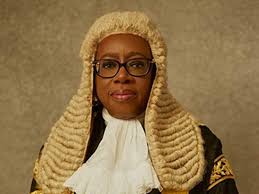Kekere-Ekun at One: How Nigeria’s Chief Justice is Rebuilding Trust in the Bench
Kekere-Ekun at One: How Nigeria’s Chief Justice is Rebuilding Trust in the Bench
On August 22, 2024, history turned a new page in Nigeria’s judiciary. Justice Kudirat Motonmori Olatokunbo Kekere-Ekun was sworn in as the 18th Chief Justice of Nigeria (CJN) at a time when public confidence in the courts was at its lowest ebb. Allegations of corruption, political interference, and inefficiency had left the judiciary battered, distrusted, and dangerously close to irrelevance.
One year later, the story is strikingly different. Under her leadership, the judiciary has begun to shed its image of compromise, finding renewed strength in accountability, transparency, and moral authority.
This is the story of her first 12 months—a year of quiet but powerful reforms that may have saved Nigeria’s justice system from implosion.
Restoring Moral Authority
In her inaugural speech, Justice Kekere-Ekun acknowledged what many had long whispered: “The judiciary is under immense pressure, its independence constantly tested, and its officers in need of urgent support.”
Those words set the tone for her tenure. Unlike her predecessors who often tiptoed around judicial failings, she confronted them head-on.
She repeatedly charged judges to deliver judgments that are “reasoned, impartial, and courageous.” Under her chairmanship, the National Judicial Council (NJC) began handling petitions against judges with new speed: dismissing frivolous ones without delay and decisively sanctioning genuine cases of misconduct.
For ordinary Nigerians, this was a turning point. For once, rogue judges were no longer untouchable.
Guarding Judicial Independence
If there was any doubt about her courage, her interventions across the states silenced them.
When the Governor of Imo State attempted to bypass seniority rules in appointing a Chief Judge, she blocked the move. In Benue, when the House of Assembly sought to illegally oust the sitting Chief Judge, she intervened again.
These were not mere administrative corrections; they were bold statements that the judiciary’s independence is non-negotiable.
Reorganising the Supreme Court
Perhaps her biggest administrative triumph has been the overhaul of the Supreme Court itself.
When she assumed office, corruption and inefficiency plagued the apex court. Case files routinely vanished, clerks extorted lawyers, and listings could be “bought.”
Her reforms dismantled this culture.
The Court Records Processing Unit merged duplicative offices, making missing files a rarity.
A Central Information Unit now provides lawyers and litigants access to case details.
A Case Continuation Unit ensures adjourned cases don’t vanish into limbo.
The Registry was digitised, and concluded cases are now archived with the National Archives.
For the first time in decades, case listings are managed transparently in open court—ending the infamous practice of “file pushing.”
Lawyers and litigants alike describe the changes as nothing short of revolutionary.
Driving Judicial Automation
Justice Kekere-Ekun is also steering the judiciary into the digital age.
Enrolment of new lawyers is now fully online and linked with Law School records.
Notary Public applications are electronic, with a global digital register—crushing the racket of fake notaries.
Supreme Court Rules 2024 introduced strict filing deadlines (45 days for appellants, 30 for respondents, 14 for replies), with penalties for late filing.
The results are tangible. In the 2024/2025 Legal Year, the Supreme Court generated ₦347.8 million—a leap from just ₦4.8 million the year before.
Virtual hearing facilities have also been expanded, making it easier for litigants outside Nigeria to participate in proceedings.
The Nigerian Bar Association hailed these reforms as “aligning Nigeria’s judiciary with global best practices.”
Boosting Staff Morale
Beyond judges, Kekere-Ekun has focused on judicial staff welfare. Salaries are now prompt, training has been expanded, and working tools provided. Dilapidated offices were refurbished, registry complaints dropped, and corruption receded.
For the first time in years, court staff describe themselves as “partners in reform” rather than pawns in a broken system.
The Verdict After One Year
In just 12 months, Justice Kekere-Ekun has achieved what many thought impossible:
Restoring public confidence in the judiciary.
Defending its independence against political interference.
Reorganising the Supreme Court for efficiency and transparency.
Driving digital transformation and financial sustainability.
Elevating staff morale and judicial welfare.
Her leadership blends moral clarity, administrative efficiency, digital innovation, and human-centered reform.
Of course, challenges remain. Nigeria’s judiciary still grapples with case backlogs, infrastructural gaps, and political pressures. The true test will be whether her reforms endure beyond her tenure.
But one thing is already clear: in her first year, Justice Kudirat Kekere-Ekun has redefined what judicial leadership can look like in Nigeria—independent, efficient, transparent, and just.
By Haruna Yakubu Haruna


















